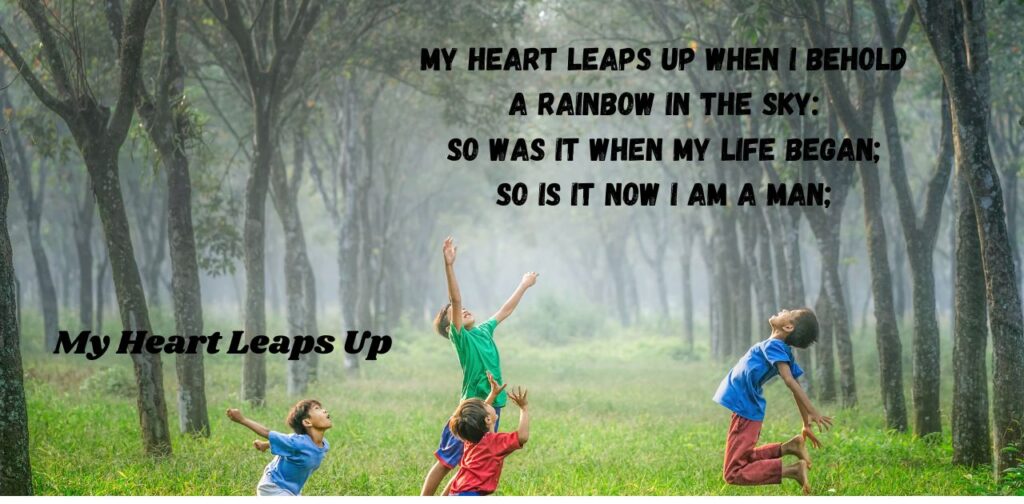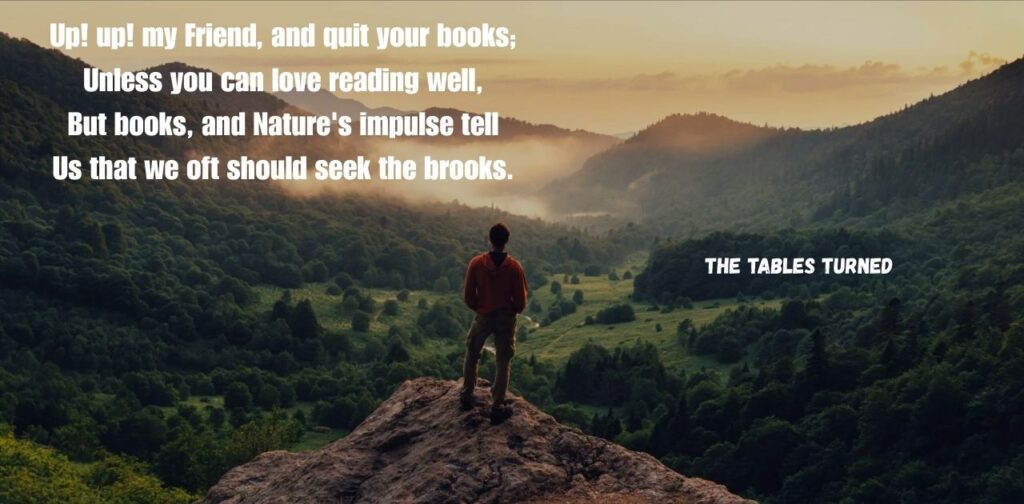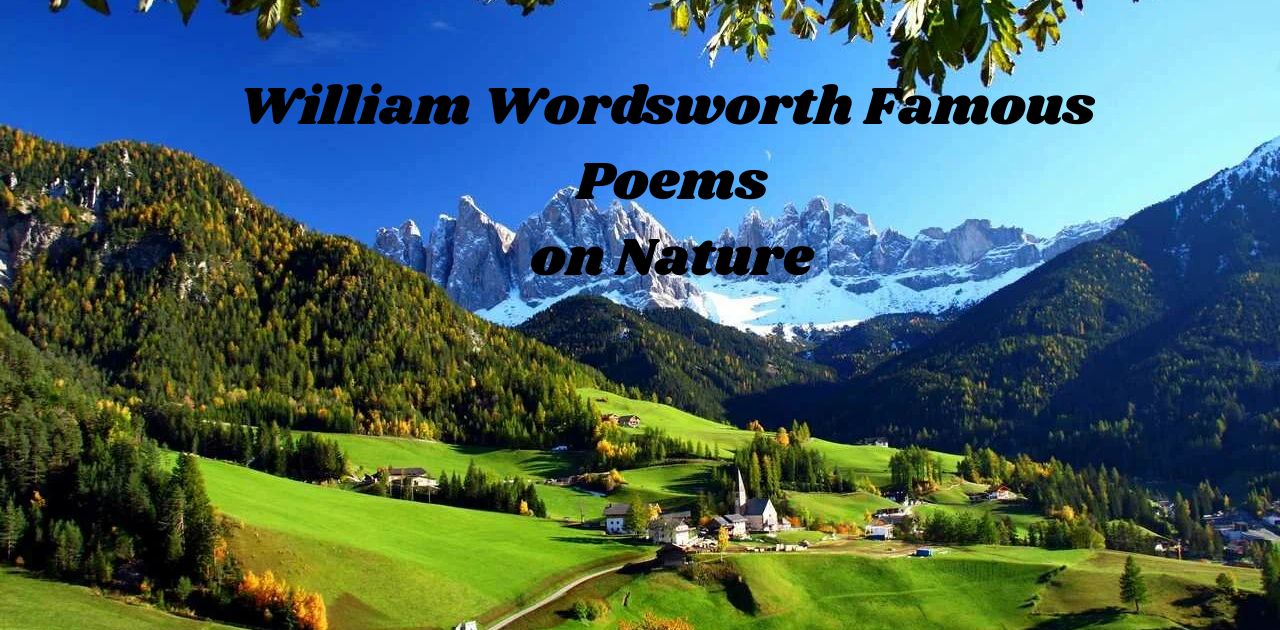William Wordsworth didn’t just write about nature—he revolutionized how we perceive our relationship with the natural world. This Lake District wanderer transformed simple encounters with flowers, mountains, and streams into profound philosophical meditations that continue resonating with readers across America and India today. His famous poems on nature aren’t mere descriptions; they’re spiritual journeys that reveal nature’s capacity to heal, teach, and inspire the human soul.
“I Wandered Lonely as a Cloud” (Daffodils)
I wandered lonely as a cloud
That floats on high o’er vales and hills,
When all at once I saw a crowd,
A host, of golden daffodils;
Beside the lake, beneath the trees,
Fluttering and dancing in the breeze.
Continuous as the stars that shine
And twinkle on the milky way,
They stretched in never-ending line
Along the margin of a bay:
Ten thousand saw I at a glance,
Tossing their heads in sprightly dance.
The waves beside them danced; but they
Out-did the sparkling waves in glee:
A poet could not but be gay,
In such a jocund company:
I gazed—and gazed—but little thought
What wealth the show to me had brought:
For oft, when on my couch I lie
In vacant or in pensive mood,
They flash upon that inward eye
Which is the bliss of solitude;
And then my heart with pleasure fills,
And dances with the daffodils.
Perhaps the most beloved Wordsworth nature poem, this masterpiece captures a moment of spontaneous joy that transforms into lasting memory. The poet’s encounter with a field of golden daffodils becomes a metaphor for how nature’s beauty can sustain us through life’s difficult moments. Written in 1804 after a walk with his sister Dorothy, this famous poem demonstrates Wordsworth’s belief that natural experiences create “spots of time” – powerful memories that nourish the soul.
“Lines Composed a Few Miles Above Tintern Abbey”
Five years have past; five summers, with the length
Of five long winters! and again I hear
These waters, rolling from their mountain-springs
With a soft inland murmur.—Once again
Do I behold these steep and lofty cliffs,
That on a wild secluded scene impress
Thoughts of more deep seclusion; and connect
The landscape with the quiet of the sky.
This monumental nature poem explores how our relationship with the natural world evolves as we mature. Wordsworth revisits the Wye Valley after five years, reflecting on how his youthful passion for nature has deepened into philosophical understanding. The poem reveals nature’s three-stage influence: childhood’s unconscious unity, youth’s passionate intensity, and adulthood’s thoughtful communion.
“The World Is Too Much with Us”
The world is too much with us; late and soon,
Getting and spending, we lay waste our powers;
Little we see in Nature that is ours;
We have given our hearts away, a sordid boon!
This Sea that bares her bosom to the moon,
The winds that will be howling at all hours,
And are up-gathered now like sleeping flowers,
For this, for everything, we are out of tune;
It moves us not.—Great God! I’d rather be
A Pagan suckled in a creed outworn;
So might I, standing on this pleasant lea,
Have glimpses that would make me less forlorn;
Have sight of Proteus rising from the sea;
Or hear old Triton blow his wreathèd horn.
This powerful sonnet critiques humanity’s disconnection from nature due to materialism and industrialization. Wordsworth laments how modern life prevents us from experiencing nature’s spiritual power. The poem’s relevance has only intensified in our digital age, making it one of his most prophetic nature poems.
More Posts:English Poems for Class 6 to 12 Students on Nature
“My Heart Leaps Up”

My heart leaps up when I behold
A rainbow in the sky:
So was it when my life began;
So is it now I am a man;
So be it when I shall grow old,
Or let me die!
The Child is father of the Man;
And I could wish my days to be
Bound each to each by natural piety.
This brief but profound poem encapsulates Wordsworth’s philosophy that our capacity for wonder should remain constant throughout life. The famous line “The Child is father of the Man” suggests that childhood’s natural reverence should guide adult understanding. Written in 1802, this nature poem celebrates the rainbow as a symbol of enduring beauty.
“To a Skylark”
Up with me! up with me into the clouds!
For thy song, Lark, is strong;
Up with me, up with me into the clouds!
Singing, singing,
With clouds and sky about thee ringing,
Lift me, guide me till I find
That spot which seems so to thy mind!
Wordsworth’s skylark poem differs from Shelley’s more famous version by focusing on the bird’s connection to earth rather than its ethereal nature. The poet seeks to join the lark’s joyous song, viewing it as a guide to spiritual elevation. This nature verse demonstrates Wordsworth’s belief that animals can teach humans about pure expression.
“The Solitary Reaper”
Behold her, single in the field,
Yon solitary Highland Lass!
Reaping and singing by herself;
Stop here, or gently pass!
Alone she cuts and binds the grain,
And sings a melancholy strain;
O listen! for the Vale profound
Is overflowing with the sound.
This haunting poem captures the mysterious beauty of a Scottish Highland girl singing while working in the fields. Wordsworth transforms a simple rural scene into a meditation on music’s power to transcend language and connect human souls. The poem celebrates how natural settings amplify human emotion and creativity.
More Posts:20+ Rhyming Poems on Nature in English
“Composed Upon Westminster Bridge”
Earth has not anything to show more fair:
Dull would he be of soul who could pass by
A sight so touching in its majesty:
This City now doth, like a garment, wear
The beauty of the morning; silent, bare,
Ships, towers, domes, theatres, and temples lie
Open unto the fields, and to the sky;
All bright and glittering in the smokeless air.
Surprisingly, this London poem finds natural beauty in an urban setting. Written during an early morning crossing of Westminster Bridge, Wordsworth discovers that cities can possess natural grandeur when viewed at the right moment. The smokeless air and morning light transform London into a scene of pristine beauty.
“The Tables Turned”

Up! up! my Friend, and quit your books;
Unless you can love reading well,
But books, and Nature’s impulse tell
Us that we oft should seek the brooks.
Come forth into the light of things,
Let Nature be your teacher.
This philosophical nature poem argues that direct experience of the natural world provides wisdom that books cannot match. Wordsworth advocates for experiential learning, suggesting that nature offers lessons in truth, beauty, and moral guidance. The poem reflects his belief that outdoor education surpasses formal schooling.
“To a Butterfly”
I’ve watched you now a full half-hour,
Self-poised upon that yellow flower;
And, little Butterfly! indeed
I know not if you sleep or feed.
How motionless!—not frozen seas
More motionless! and then
What joy awaits you, when the breeze
Hath found you out among the men,
That live in this warm corner!
Wordsworth’s butterfly poem demonstrates his ability to find profound meaning in the smallest natural creatures. The butterfly becomes a symbol of delicate beauty and the fleeting nature of life’s precious moments. This gentle nature verse showcases the poet’s microscopic attention to nature’s details.
“I Heard a Thousand Blended Notes”
I heard a thousand blended notes,
While in a grove I sate reclined,
In that sweet mood when pleasant thoughts
Bring sad thoughts to the mind.
To her fair works did Nature link
The human soul that through me ran;
And much it grieved my heart to think
What man has made of man.
This reflective poem contrasts nature’s harmony with human discord. While enjoying a peaceful grove, Wordsworth experiences both joy and sorrow, celebrating nature’s perfection while lamenting humanity’s failings. The poem illustrates how natural beauty can simultaneously inspire and sadden the thoughtful observer.
“Nutting”
It seems a day
(I speak of one from many singled out)
One of those heavenly days that cannot die;
When, in the eagerness of boyish hope,
I left our cottage-threshold, sallying forth
With a huge wallet o’er my shoulders slung,
A nutting-crook in hand…
This autobiographical nature poem recounts a childhood expedition to gather hazelnuts that becomes a meditation on humanity’s relationship with nature. The young Wordsworth’s innocent destruction of a beautiful bower leads to mature understanding about respecting natural spaces. The poem warns against thoughtless exploitation of nature’s gifts.
“Michael: A Pastoral Poem”

If from the public way you turn your steps
Up the tumultuous brook of Green-head Ghyll,
You will suppose that with an upright path
Your feet must struggle; in such bold ascent
The pastoral mountains front you, face to face.
This epic pastoral poem tells the story of an elderly shepherd who loses his son to the corruptions of city life. Set in the Lake District, the poem explores how rural landscapes shape character and values. Michael’s connection to his land represents the traditional relationship between humans and nature that industrialization threatened.
More Posts:20+ Enchanting Short Poems by Ruskin Bond
“The Prelude” (Selected Nature Passages)
Fair seed-time had my soul, and I grew up
Fostered alike by beauty and by fear:
Much favoured in my birth-place, and no less
In that beloved Vale to which erelong
We were transplanted…
Wordsworth’s autobiographical masterpiece contains some of his most powerful nature poetry. These selected passages reveal how natural experiences during childhood and youth shaped his poetic consciousness. The poem demonstrates nature’s role as both teacher and spiritual guide throughout the poet’s development.
“Home at Grasmere”
Once to the verge of yon receding hills
Did I advance, a juvenile traveller;
I saw, and I was satisfied with what I saw;
But now I dwell, and dwelling, I have found
How blessed I am in being here to dwell.
This celebration of place expresses Wordsworth’s deep contentment with his chosen home in Grasmere Valley. The poem explores how finding the right natural environment can fulfill one’s deepest spiritual needs. It represents the poet’s mature understanding that true happiness comes from harmonious relationship with a beloved landscape.
“An Evening Walk”
Far from my dearest Friend, ’tis mine to rove
Through bare grey dell, high wood, and pastoral cove;
Where Derwent rests, and listens to the roar
That stuns the tremulous cliffs of high Lodore…
One of Wordsworth’s earliest nature poems, “An Evening Walk” established many themes he would develop throughout his career. The poem celebrates the Lake District’s sublime beauty while introducing his technique of finding spiritual significance in natural landscapes. Written during his university years, it shows his emerging poetic voice.
Conclusion
Wordsworth’s famous poems on nature transcend mere observation—they’re invitations to rediscover wonder in our increasingly digitized world. Whether you’re walking through Central Park or trekking the Western Ghats, these verses remind you that nature remains our greatest teacher, healer, and source of spiritual renewal. His legacy challenges modern readers to slow down, observe deeply, and find the extraordinary within the ordinary moments that surround us daily.

Admin of https://aspirenowa.com/. Sharing Touching and Thoughtful Poems for all Hearts. I Believe in Simple Words, Deep Meaning, and Inspiring Emotions through Poetry for Every Reader.










